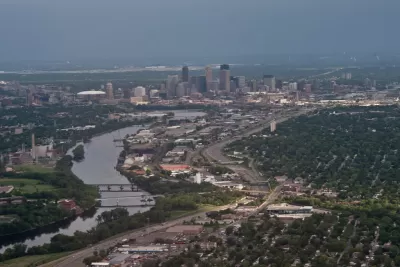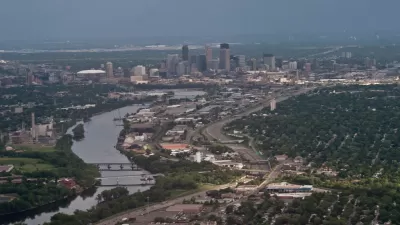A plan for 48 acres of riverfront land could make Minneapolis a leader in doing redevelopment right, argue city leaders.

The Minneapolis City Council on Friday approved a plan for the Upper Harbor Terminal, an industrial riverfront area north of downtown. Ahead of an earlier city council committee vote on the plan, Mayor Jacob Frey and Phillipe Cunningham, a member of the city council, made the case for the redevelopment project:
The sustained exclusion from opportunities afforded by the riverfront is a sad legacy that we simply must change. Done right, redevelopment of the Upper Harbor Terminal holds the opportunity to ensure that current residents benefit, that the area’s economy thrives and that the north Minneapolis riverfront is highlighted in deserving fashion.
The concept plan includes a performing arts center, green space, housing, a business center, and a utility hub. The plan, argue Frey and Cunningham, reflects an approach that ensures equity is part of the redevelopment process and demonstrates how other cities can maximize public investment while also addressing longstanding economic inequality.
"With 41 percent of the land designated for park use, plans for new employment opportunities, more affordable housing and a signature concert venue, Minneapolis has a chance to create a national model for equitable economic development that stabilizes community while expanding riverfront access," say Frey and Cunningham.
The plan has been controversial, with community and environmental advocates outlining a series of concerns about privatization of land, restricted public access to green space, and gentrification effects on surrounding neighborhoods.
Frey and Cunningham say they are committed to a collaborative planning process that will directly involve the community. "This is an undertaking of historic proportions, and part of changing history means we put north Minneapolis first and make sure North Side residents are involved in the planning process."
FULL STORY: Minneapolis development and economic equity: Upper Harbor Terminal can be a national model

Maui's Vacation Rental Debate Turns Ugly
Verbal attacks, misinformation campaigns and fistfights plague a high-stakes debate to convert thousands of vacation rentals into long-term housing.

Planetizen Federal Action Tracker
A weekly monitor of how Trump’s orders and actions are impacting planners and planning in America.

Chicago’s Ghost Rails
Just beneath the surface of the modern city lie the remnants of its expansive early 20th-century streetcar system.

Bend, Oregon Zoning Reforms Prioritize Small-Scale Housing
The city altered its zoning code to allow multi-family housing and eliminated parking mandates citywide.

Amtrak Cutting Jobs, Funding to High-Speed Rail
The agency plans to cut 10 percent of its workforce and has confirmed it will not fund new high-speed rail projects.

LA Denies Basic Services to Unhoused Residents
The city has repeatedly failed to respond to requests for trash pickup at encampment sites, and eliminated a program that provided mobile showers and toilets.
Urban Design for Planners 1: Software Tools
This six-course series explores essential urban design concepts using open source software and equips planners with the tools they need to participate fully in the urban design process.
Planning for Universal Design
Learn the tools for implementing Universal Design in planning regulations.
planning NEXT
Appalachian Highlands Housing Partners
Mpact (founded as Rail~Volution)
City of Camden Redevelopment Agency
City of Astoria
City of Portland
City of Laramie




























